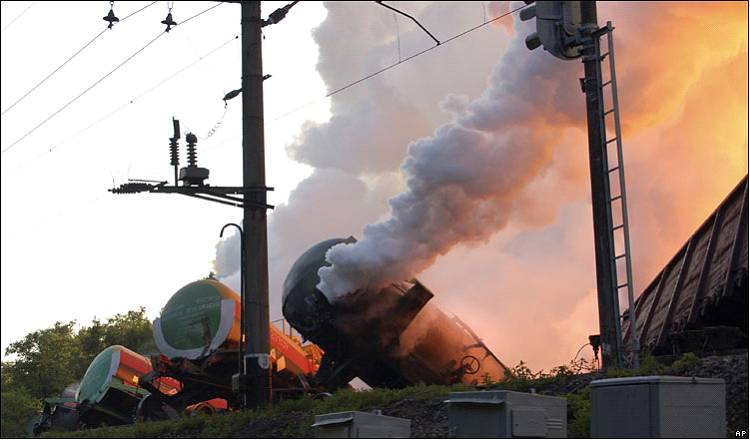Incident Report
Subject: Poison Threat from Ukraine Train
Date
of Email reporting Incident: Wed 18/07/2007
Report Detail:

18 July 2007
Hundreds of Ukrainians have been evacuated from their homes after a train carrying highly toxic phosphorous derailed and caught fire near Lviv.
At least 20 people were taken to hospital with poisoning after the fire caused a massive toxic cloud. Remaining local residents were told to use gas masks and stay indoors. Ukrainian authorities are trying to establish what caused the crash, but said there was no suggestion of sabotage or terrorism. The freight train, which was en route from Kazakhstan to Poland, derailed near Lviv, a town not far from the Polish border in western Ukraine on Monday night. Fifteen of the train's 58 cars overturned, six of which then caught fire, officials said. The toxic yellow cloud caused by the blaze covered an area of 90 sq km (34.7 sq miles) above 14 villages near Lviv before dispersing on Tuesday. Fire-fighters wearing masks and protective clothing managed to extinguish the fire after several hours.
'Grave catastrophe'
Phosphorus compounds are mainly used in fertilisers, but can also be used to produce pesticides, cleaning products and explosives. The chemical can cause damage to the liver, the heart or the kidneys if consumed. In many cases exposure can be fatal. Many people were evacuated at their own request. Authorities advised those remaining not to eat vegetables from their gardens or drink milk produced from their cows. The Ukrainian Deputy Prime Minister, Oleksandr Kuzmuk, said the toxic cloud was a worrying development and compared the accident to the blast at the Chernobyl nuclear reactor in 1986. "After Chernobyl we are again confronted with a grave catastrophe which may pose a serious danger to the Ukrainian people," he said. "The consequences are unpredictable. We are now looking into how dangerous the phosphorus is." He later backtracked, while other officials were careful to play down any comparisons with Chernobyl and said they had minimised the risk to public health. "The cloud of a toxic gas dispersed and there is no threat to people's lives," Ihor Krol, a spokesman for the Emergency Situations Ministry, told the Associated Press.
|

